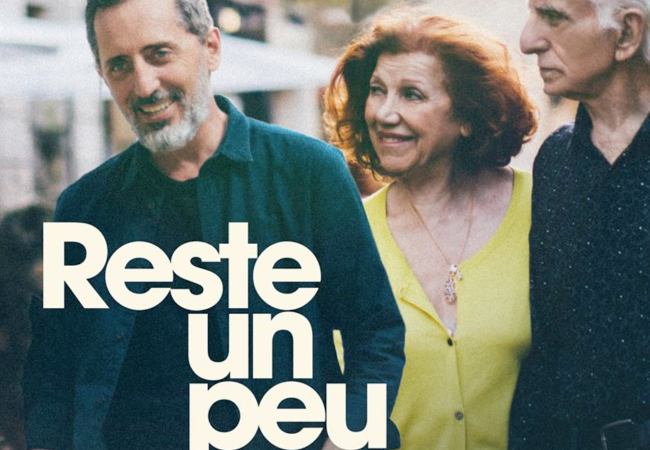Film Review: Gad Elmaleh’s ‘Reste Un Peu’
- SUBSCRIBE
- ALREADY SUBSCRIBED?
BECOME A BONJOUR PARIS MEMBER
Gain full access to our collection of over 5,000 articles and bring the City of Light into your life. Just 60 USD per year.
Find out why you should become a member here.
Sign in
Fill in your credentials below.
A film about a French-Jewish comic’s tortuous odyssey from Judaism to Catholicism and back might seem an unlikely Christmas movie. It doesn’t even take place during Christmas, or Hanukkah, for that matter. However, Gad Elmaleh’s superb Reste Un Peu (literally Stay Awhile) has the uplift, humor, and soul-searching of the best Yuletide stories, from A Christmas Carol to A Charlie Brown Christmas. The premise is simple: Gad, a famous stand-up comic (like the director) returns from a sojourn in the United States, converted to the Roman Catholic faith, and will soon finalize this with his baptism. However, he has to break the news to his very Jewish parents … his very, very Jewish parents. As you might imagine, the simple premise results in a film that is anything but simple.
View this post on Instagram
By chance I was fortunate enough to attend a screening where Elmaleh was on hand to comment on his film and take questions from the public. He admitted that Reste Un Peu is a sort of autofiction. Not only does he, Gad Elmaleh, play a character named Gad Elmaleh, but his own parents and sister (David, Régine and Judith Elmaleh) play themselves (brilliantly and riotously). Other cast members are non-actors playing themselves, including Mehdi, a real-life friend who converted from Islam to Catholicism (after a warm-up in Protestantism), and a sensitive young priest who has a parish in Boulogne, just outside Paris.
View this post on Instagram
But when Elmaleh says that the film “is and isn’t” autobiographical, he indicates that his work is less literal-minded autofiction than slipping and sliding in ambiguous territory that recalls Philip Roth’s fiction. Elmaleh’s character is much sweeter than Roth or his personas, but the film reminded me a bit of The Counterlife, with its refusal to be locked into one version of reality. Otherwise, the film makes it plain that Jewish humor transcends borders (and time periods), especially when it comes to Jewish moms. The father isn’t chopped liver, either.
View this post on Instagram
The film’s double narrative rests on one hand on Gad’s prevaricating and deceiving his parents and family-members (and maybe himself), and also reconciling with them. There are also spiritual tussles with Jewish friends and a couple of rabbis. On the other hand, we see him preparing for his baptism with genial Catholics: a nun, the young priest, a monk. On both sides the spiritual search is leavened with gentle, sometimes broad, humor. (A scene in a monastery cell where a crucifix keeps falling off the wall is broadly funny but also evocative.)
There are some odd aspects of Gad’s path leading to Catholicism. First, that it happened when he was in America. One might think it would have been the evangelicals that put the zap on his soul. But it appears that he was already in virtual touch with his French Catholic mentors while in the US. The real Gad explained that he’d gone to America to try making it in stand-up in English, and that stretched his sense of the possible. He also said that he found that Americans seemed more at ease discussing faith. There are a few sequences of Gad on stage, riffing on how the French deal (or not) with spiritual matters. This works as a kind of free associating, though to be honest I find Elmaleh more engaging as an actor than as a stand-up comedian (maybe it’s cultural — that Stateside effort doesn’t seem to have panned out).
View this post on Instagram
What’s also intriguing is that Gad’s interest in Catholicism focuses essentially on the Virgin Mary. He first had a spiritual experience as a child in Morocco, when he’d walked into a church (which was taboo amongst Jews and Muslims) and was affected by a statue of the Virgin. He seems obsessed with Marianism, with Mary’s spiritual aura, rather than by Jesus, the crucifixion and resurrection. Indeed, little mention is made of Jesus. This is small comfort to his Jewish mother, who feels she’s being displaced by another Jewish mother. (As an amateur painter she will take hilarious revenge through her art.)
View this post on Instagram
Gad’s father enjoys spending his leisure time in flight simulators, making sure he lands his virtual airplanes safely. He acidly reminds his son that the Sephardim they descended from lived in Spain for generations, until they were expelled by arch-Catholic Queen Isabella, and found safe haven in Morocco. He doesn’t mention that many Jews had to leave the countries of the Maghreb after they won independence, or that many others were deported from France during the Occupation. A French-Sephardic friend told me she’d immigrated with her family to Israel, only to leave there as well, because of the harsh conditions of the time. It’s no wonder Gad is preoccupied with paths rather than destinations.
Our quester meets a number of odd characters along the way. A turning point is meeting a young woman in a church (radiantly played by Olivia Jubin), who abruptly says she will pray for him. She might be compared to a youthful Mary figure, or else to Dante’s Beatrice. She helps guide him to the final stretch of his search for a solution to his spiritual conundrum, one that will accommodate both baptism and a return to his Jewish roots. Whether his efforts (both of the “real” Gad and the character based on him) work — and I have my doubts — the climactic finale is funny and moving.
View this post on Instagram
There’s a poignant scene in which Gad’s parents are in bed and sing a song in Hebrew about life being a bridge, and not being afraid as one crosses over it. At another moment, when asked about his son’s opening the door to that church in Morocco, the father says that when Gad was a child he had a passion for doors, and opening them. Reste Un Peu is a humane, but also raucous and earthy, film about both doors and bridges, and justifies its invitation to the audience to come and stay a while.
Production: KS2 Production/Vito Films
Distribution: Studiocanal
Lead photo credit : Image: Vito Films/Studiocanal
More in film, film review, Gad Elmaleh, Reste Un Peu, Stay Awhile




